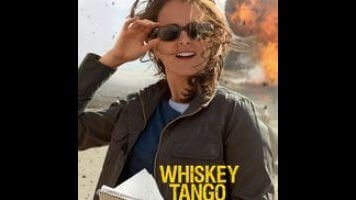Kim isn’t handed the reins of her own TV show; if anything, she feels cut loose when she volunteers for an on-air reporting gig at her news network that involves relocating to Afghanistan for an extended period. The movie deposits her there in swift order, leaving her motivations for later, and it’s nicely jarring to see Fey starring in a movie with less of the studio sheen that glows, sometimes too brightly, from both her studio comedies and her occasional dramedies. (Whiskey isn’t exactly an indie, but on the scale of Paramount pictures with the Lorne Michaels name on them, it’s pretty far afield from Mean Girls or Tommy Boy.) This is the grittiest and most mussed Fey has been on film, and certain aspects of Whiskey Tango Foxtrot, like the freedom and inventiveness with which she can swear, are a fine extension of her comic persona.
But co-directors Glenn Ficarra and John Requa aren’t making the broadly comic version of this story; Fey and Carlock’s self-effacing wit functions more as window-dressing, arranged with restraint. Characters like photographer Iain MacKelpie (Freeman), fellow reporter Tanya Vanderpoel (Margot Robbie), and Kim’s soft-spoken guide Fahim (Christopher Abbott from Girls and James White, making an unexpected play for Ben Kingsley status) are relatively grounded. Fey has good chemistry with most of these actors and enough time with almost none of them.
While only a few of those supporting players, like local official Ali Massoud Sadiq (Alfred Molina, making a somewhat more expected play for Ben Kingsley status), are drawn with sketch-like exaggeration, Kim’s embeds, interviews, and story-hunting nonetheless breeze by like little half-finished sketches, never really detonating great jokes or pointed satire. Even at its best, the dialogue moves slower than it ought to, and the movie’s fun-house mirror of real-life craziness (based on the memoir The Taliban Shuffle) never equals the deadpan wonder that Ficarra and Requa brought to the similarly fact-based I Love You, Phillip Morris.
There’s lots of talk about how Kim is losing herself in the “Ka-bubble” (the particular and insulated life as a journalist in Kabul—wherein, among other things, she becomes a “9.5” in terms of attractiveness), but the movie only occasionally offers a glimpse of that heedless madness. Mostly it just throws to some debauched party scenes and cuts away too fast to really immerse the audience in them—never mind exposing them to more troubling situations in Afghanistan. By eliding some of these details, the movie mirrors the very treatment of the war in Afghanistan that Kim and company complain about as it’s shunted aside in favor of Iraq. The irony does not appear intentional.
There are plenty of engaging aspects to Whiskey Tango Foxtrot: ideas about how reporters can become as acclimated as soldiers to the constant, sometimes adrenalized rush of a modern-day forever-war; the fumbling romance between Kim and Iain (consistently punctuated with the sound of morning-after teeth-brushing); the friendly-until-it’s-not competition between Kim and Tanya (Fey and Robbie suggest they could do a snappy buddy comedy). But the filmmaking fails to draw this material together in a cohesive way, and the resulting fragmentation feels more like a side effect than a skillful style choice. In the end, Whiskey Tango Foxtrot plays like a slightly above-average version of the narrative where a single gal (or in the movie’s self-effacing parlance, “white lady”) finds herself—and even that business was better-handled (and tweaked with more specificity) on Fey’s TV show. A movie like this doesn’t require 30 Rock’s joke density or silly streak, but it’s surprising that Fey and Carlock’s satirical eyes aren’t a little more alert.


 Keep scrolling for more great stories from A.V. Club.
Keep scrolling for more great stories from A.V. Club.